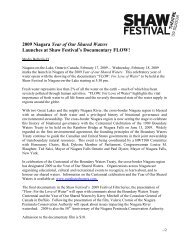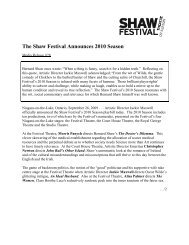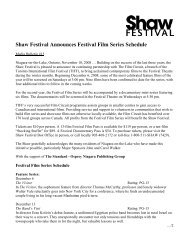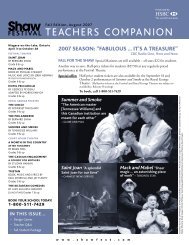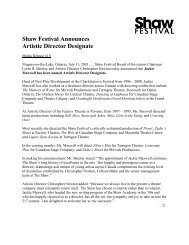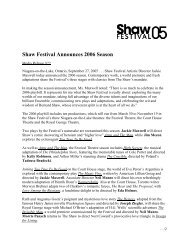Ragtime - Shaw Festival Theatre
Ragtime - Shaw Festival Theatre
Ragtime - Shaw Festival Theatre
Create successful ePaper yourself
Turn your PDF publications into a flip-book with our unique Google optimized e-Paper software.
“The tumultuous early years of the 20th century in America were marked by<br />
confidence, energy, and ambition.<br />
These were years of social change, immigration, exploration,<br />
and technological progress,<br />
alongside class warfare, racial discrimination, and anarchy”.<br />
- Lois Kivesto<br />
UNDERSTANDING THE WORLD OF THE PLAY<br />
<strong>Ragtime</strong> tells the story of three families struggling to adapt in a rapidly changing society. Early 20th<br />
century America was booming with technological innovation and industrialization, faced with civil<br />
rights struggles, injustice, and social unrest. On the stage, we see the beginning of a number of social<br />
movements: feminism, radicalism, the civil rights and labour movements, as well as other components<br />
of the struggle for reform. To paint a picture of the times:<br />
- In July 1900 the US census totals 76 million<br />
- There are more telephones than bathtubs<br />
- There are more blacksmiths than doctors<br />
- There are eight thousand cars, and less than 10 miles of concrete road in the entire United States of<br />
America<br />
- Most Americans still live in rural areas without running water, indoor plumbing, or electricity<br />
- Machines begin to replace farm workers<br />
- Trains provide transportation<br />
- Seven million people move to cities nationwide<br />
- The wealth of the country is in the hands of a small number of financiers who have established<br />
monopolies. Among the most prominent of these men were John D. Rockefeller, Andrew<br />
Carnegie, Andrew Mellon, and the most powerful of them all, John Pierpont Morgan—a real historical<br />
figure who appears as a character in <strong>Ragtime</strong>.<br />
SOCIAL CHANGE<br />
Refers to a significant change in the behavior patterns and cultural values or norms of a society—<br />
changes that have profound sociological consequences. Examples of significant social changes having<br />
long-term effects include the industrial revolution, the abolition of slavery, and the feminist<br />
movement. Social change can be driven by a number of forces, including: culture, religion, economy,<br />
science, and technology.<br />
SOURCES:<br />
http://pbskids.org/bigapplehistory/index-flash.html— continue research here<br />
http://www.pbs.org/wgbh/amex/1900/tguide/tguideprogram.html<br />
http://www.randomhouse.com/catalog/teachers_guides/9780812978186.pdf<br />
13<br />
C ONNECTIONS<br />
<strong>Shaw</strong> <strong>Festival</strong> Study Guide





